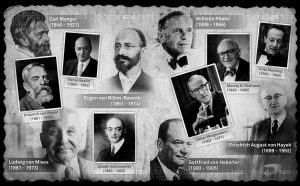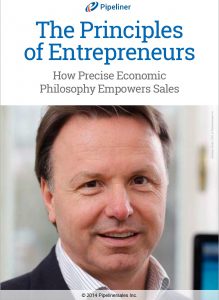Austrian School Foundation
The Austrian School of Economics is not a physical institution; rather it is a school of economic thought. Based on analysis of the purposeful actions of individuals, the Austrian School has been studied throughout the world, and has been improved upon and followed by successful business thinkers. While it carries the name of the country, the Austrian School has little to do with Austria, apart from the fact that it originated in Vienna.
The foundations of the Austrian School were laid centuries ago. Nonetheless I see this understanding of economics as being very current because it views the general market as an entrepreneurial process.
The current state of this theory has as its main thought leaders Murray Rothbard, Carl Menger, Joseph Schumpeter, Eugen Boehm von Bawerk, Fritz Machlup, Friedrich August von Hayek and especially Ludwig von Mises. These are all highly accomplished entrepreneurs, philosophers, economists, and authors of landmark books and theses.
One popular book, The Road to Serfdom by F. A. Hayek, played a key role, following the New Deal and World War II, in the revival of the classical liberal movement in America. Other works examined monetary reform, exchange rates and capital theory – and a number of these have been utilized in today’s markets. Indeed some have even become key in the evolution of today’s business.
In that the Austrian School is the singular school of economic thought that places entrepreneurship in a central role in economic development, it is central to all of my books and thinking.
How the Austrian School of Economics Works
The Austrian School’s method is deductive. Its view of the economy is not conducted through simply amassing data and feeding it into incredibly abstract formulas in an effort to predict the unpredictable (formulas that become so complex they could hardly be called formulas any longer).
Through the use of deduction and logical implication of common truths (as examples means are scarce, wants are unlimited), a business plan can be raised to entirely new level–one not simply based in abstract theory, but that is part and parcel of the real world.
Instead of viewing the economy through a never-ending list of overlapping formulas, the Austrian School has as its objective the restoration of the economy as a human-based science. Friedrich August von Hayek, Carl Menger and others demonstrated that instead of being homogeneous (composed of parts with common origin), it is rather a diverse and intricate structure with a time dimension.
Universities that currently have a significant Austrian School presence are Loyola University New Orleans, George Mason University, Auburn University and New York University in the United States, and Universidad Francisco Marroquín in Guatemala.
The entrepreneur is not only capable of seeing opportunities that others miss, but is innovative in taking advantage of them and exploiting them for profit, benefiting themselves, their companies, and their local and national economies.
Famous Austrian Economists
There were many authors and economists who contributed to the overall theory, but the most influential and well-known were Carl Menger, Ludwig von Mises and Friedrich August von Hayek.
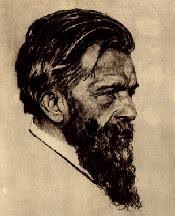 Carl Menger (1840 – 1921)
Carl Menger (1840 – 1921)
Menger was the founding father of the Austrian School of Economics, and was first to regard the economy as the result of individual actions rather than exact science. His works were rejected at first for being “subjectivist” and inaccurate, only to be praised later for unveiling the economy for what it really is: individuals acting to satisfy their wants. Using his subjective theory of value he arrived at one of the most powerful insights in economics: both sides gain from exchange. Learn more about Carl Menger.
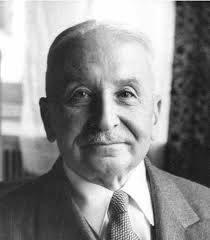 Ludwig von Mises (1881 – 1973)
Ludwig von Mises (1881 – 1973)
A student of Carl Menger, Mises was quick to evolve and push Menger’s philosophy even further. Explaining what causes business cycles—and being able to save Austria from the inflation that troubled Germany in 1920s—Mises is truly is one of the great minds of the Austrian School. His groundbreaking work on money and credit (and his deeper exploration of the individual need behind the supply and demand and the “price“ of money itself) solidified the position of Austrian economics in the world. Learn more about Ludwig von Mises.
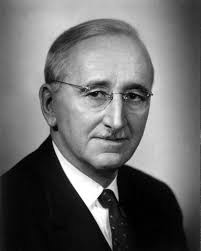 Friedrich August von Hayek (1899 – 1992)
Friedrich August von Hayek (1899 – 1992)
Hayek was a well-known philosopher, thinker, and author of his era, and is a legend in the world of economics. His theories became extremely popular in the 1970s, and in 1974 he was awarded the Nobel Prize for Economic Sciences. His theories proved that financial crises in history were a fabrication of powerful government manipulations – creating false booms, lowering interest rates, and more. His works defended the free market and free entrepreneurial spirit that drives business and the world of economy. Learn more about Friedrich von Hayek.
Why we are Austrian Economists
With the Austrian theory of the business cycle—along with a new understanding of the sales process and the ever-changing approach towards market and economy in the modern world—it is evident that there is not much that can really stay constant and fixed, even within the snug, “precise” view of economic sciences.
Economics cannot exist in isolation from the real world. Software development gives us revolutionary tools to break new ground and explore individual minds even more deeply, aiding the entrepreneurship within ourselves. The only thing that the economy can always rely on is the entrepreneurial spirit within people.
 “We will conclude by defining society as a process (i.e. a dynamic structure) which is: spontaneous, and thus not consciously designed by anyone; highly complex, since it comprises millions and millions of people with an infinite range of constantly changing goals, tastes, valuations, and practical knowledge; and composed of human interactions (which are basically exchange dealings that frequently yield monetary prices and are always carried out according to certain rules, habits, or standards of conduct). All such human interactions are motivated and driven by the force of entrepreneurship, which continually creates, discovers, and transmits information or knowledge, as it adjusts and coordinates different people’s contradictory plans through competition and enables them all to coexist in an increasingly rich and complex environment.”
“We will conclude by defining society as a process (i.e. a dynamic structure) which is: spontaneous, and thus not consciously designed by anyone; highly complex, since it comprises millions and millions of people with an infinite range of constantly changing goals, tastes, valuations, and practical knowledge; and composed of human interactions (which are basically exchange dealings that frequently yield monetary prices and are always carried out according to certain rules, habits, or standards of conduct). All such human interactions are motivated and driven by the force of entrepreneurship, which continually creates, discovers, and transmits information or knowledge, as it adjusts and coordinates different people’s contradictory plans through competition and enables them all to coexist in an increasingly rich and complex environment.”
Jesus Huerta de Soto
Author of The Austrian School – Market Order and Entrepreneurial Creativity
These concepts are the reason we developed the sales management software called Pipeliner CRM. Our product is based on the highly relevant findings of 150 years of economic history and economic theory as developed by the Austrian School. The objective is to provide the best possible support for entrepreneurship.
The Pipeliner Philosophy
The Austrian School began with a radical thought: What something called praxeology—a study of human action based on the notion that humans engage in purposeful behavior—was applied to economics? Praxeology says that people are not just reactive, they’re proactive. The things they do are purposeful. Perhaps the most purposeful and proactive people in any commercial enterprise—besides the entrepreneur that founded it—are the salespeople. They are truly the “entrepreneurs within the enterprise.” Or, as we refer to them, salespreneurs.
Once you understand purposeful behavior, you see how salespeople make decisions. Once you know a bit about decision theory, you can plan for the types of things salespeople do and can support the ways they think and work. You can follow the natural order of things
These principles were woven into the very fabric of Pipeliner CRM. Instead of the top-down, management-heavy traditional CRM that makes salespeople cringe and turns them into box-checking automatons, Pipeliner CRM is built on the notion that salespeople naturally want to sell; they’re driven to it naturally, organically, entrepreneurially. Pipeliner gives them the insights and the tools to do just that: visualize and realize the sales goals they’re pursuing. Pipeliner not only protects the entrepreneurial process, it empowers it.
Learn more the basic principles we’re helping put into practice through Pipeliner CRM. Download our free ebook The Principles of Entrepreneurs.

